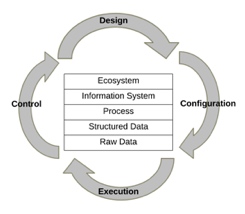The SIGMA team contributes to help, support and enable the continuous evolution of information systems that underlie a connected and innovative society. The goal is to fulfill important expectation so to reach the point where information driven ecosystems would be responsible considering evolving cost, access control, privacy or ethical issues. Indeed, information systems roles in modern public and private organizations are growing and must benefit to numbers and not to a minority. People must perceive, understand and master the full implications of their role in the information system or ecosystem. When involved in a complex digital and human ecosystem, people’s implication has a purpose that needs to be explicit, the particular essence and consequences of use and misuse must be explicit and understood by everyone. Understandably, privacy, security, ethical concerns, trustworthiness are challenges related to the constant evolution of complex digital information driven human ecosystems.
Thanks to its wide sphere of competence, the SIGMA team has the ability to address these challenges in an original cross level and across cycles approach. The SIGMA team aims to contribute at Building responsible information driven ecosystems working at different abstraction levels of information driven ecosystems (raw data, structured data, processes, information systems, ecosystems) and at different steps of their life cycle (Design, Configuration, Execution and Control): cf. Figure.
Fig. : Abstraction levels and life cycle of responsible information driven ecosystems
Our main application domains will continue to privilege human centered application domains, in particular health and transportation with a focus on frail people. In these types of ecosystems, user-centered approaches have given users an important role, for example in health domain in the creation and transfer of the patient medical data (adapted and adaptive care protocol, integration of self-care devices, etc.). But we are witnessing a paradigm shift where citizens are no longer just actors but co-constructors of the ecosystems. For example, patients are organizers of their relationships with the medical world, co-constructors of their care processes and wishing to control the flow of their data from medical records or mobile devices on integrative health platforms (shared medical record, regional health platforms) or social networks dedicated to health.
